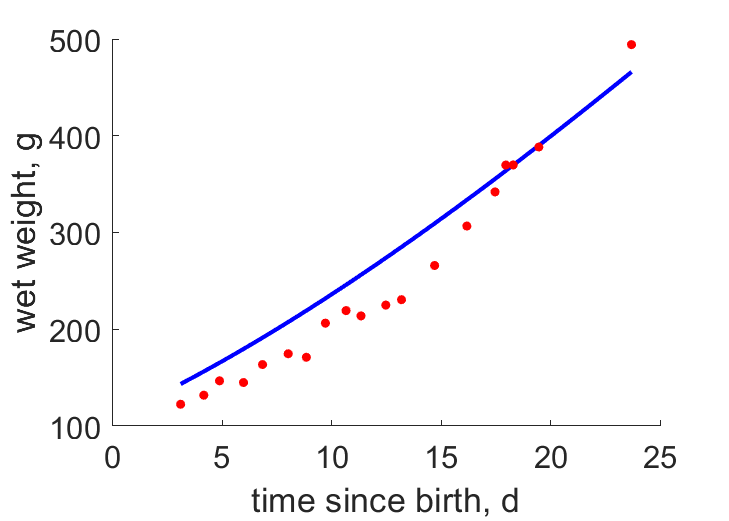Predictions & Data for this entry
| Model: stx | climate: BSh, BWh | migrate: | phylum: |
| COMPLETE = 2.5 | ecozone: THp, TPa | food: bxM, xiH | class: |
| MRE = 0.081 | habitat: 0iTg, 0iTs | gender: Dg | order: |
| SMSE = 0.011 | embryo: Tv | reprod: O | family: |
Zero-variate data
| Data | Observed | Predicted | (RE) | Unit | Description | Reference |
|---|---|---|---|---|---|---|
| tg | 43 | 43.21 | (0.004809) | d | gestation time | AnAge |
| tx | 33 | 39.92 | (0.2097) | d | time since birth at weaning | AnAge |
| tp | 228 | 228.2 | (0.0007346) | d | time since birth at puberty for female | AnAge |
| tpm | 175 | 175 | (0.0002334) | d | time since birth at puberty for male | AnAge |
| am | 3248 | 3250 | (0.0004417) | d | life span | AnAge |
| Wwb | 118.4 | 108.5 | (0.08395) | g | wet weight at birth | AnAge |
| Wwx | 943.3 | 775.9 | (0.1774) | g | wet weight at weaning | AnAge |
| Wwi | 2358 | 2498 | (0.05949) | g | ultimate wet weight | AnAge |
| Ri | 0.02351 | 0.02255 | (0.04066) | #/d | maximum reprod rate | AnAge |
Uni- and bivariate data
| Data | Figure | Independent variable | Dependent variable | (RE) | Reference |
|---|---|---|---|---|---|
| tW |  | time since birth | wet weight | (0.1122) | Fren1989 |
Pseudo-data at Tref = 20°C
| Data | Generalised animal | Lepus capensis | Unit | Description |
|---|---|---|---|---|
| v | 0.02 | 0.08996 | cm/d | energy conductance |
| kap | 0.8 | 0.9065 | - | allocation fraction to soma |
| kap_R | 0.95 | 0.9316 | - | reproduction efficiency |
| p_M | 18 | 495 | J/d.cm^3 | vol-spec som maint |
| k_J | 0.002 | 0.002 | 1/d | maturity maint rate coefficient |
| kap_G | 0.8 | 0.8005 | - | growth efficiency |
| t_0 | 0 | 26.49 | d | time at start development |
Discussion
- Body temperature of Lepus townsendii
- Males are assumend to differ from females by E_Hp only
- Due to milk being extremely nutritious in lagomorphs, the growth rate, and therefore [p_M], is probably over-estimated with this data
- mod_1: addition tW data
Bibliography